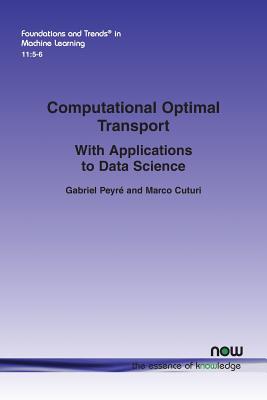Computational Optimal Transport: With Applications to Data Science

Computational Optimal Transport: With Applications to Data Science
The goal of Optimal Transport (OT) is to define geometric tools that are useful to compare probability distributions. Their use dates back to 1781.
Recent years have witnessed a new revolution in the spread of OT, thanks to the emergence of approximate solvers that can scale to sizes and dimensions that are relevant to data sciences. Thanks to this newfound scalability, OT is being increasingly used to unlock various problems in imaging sciences (such as color or texture processing), computer vision and graphics (for shape manipulation) or machine learning (for regression, classification and density fitting). This monograph reviews OT with a bias toward numerical methods and their applications in data sciences, and sheds lights on the theoretical properties of OT that make it particularly useful for some of these applications.
Computational Optimal Transport presents an overview of the main theoretical insights that support the practical effectiveness of OT before explaining how to turn these insights into fast computational schemes. Written for readers at all levels, the authors provide descriptions of foundational theory at two-levels. Generally accessible to all readers, more advanced readers can read the specially identified more general mathematical expositions of optimal transport tailored for discrete measures. Furthermore, several chapters deal with the interplay between continuous and discrete measures, and are thus targeting a more mathematically-inclined audience.
This monograph will be a valuable reference for researchers and students wishing to get a thorough understanding of Computational Optimal Transport, a mathematical gem at the interface of probability, analysis and optimization.
PRP: 852.72 Lei
Acesta este Pretul Recomandat de Producator. Pretul de vanzare al produsului este afisat mai jos.
767.45Lei
767.45Lei
852.72 LeiLivrare in 2-4 saptamani
Descrierea produsului
The goal of Optimal Transport (OT) is to define geometric tools that are useful to compare probability distributions. Their use dates back to 1781.
Recent years have witnessed a new revolution in the spread of OT, thanks to the emergence of approximate solvers that can scale to sizes and dimensions that are relevant to data sciences. Thanks to this newfound scalability, OT is being increasingly used to unlock various problems in imaging sciences (such as color or texture processing), computer vision and graphics (for shape manipulation) or machine learning (for regression, classification and density fitting). This monograph reviews OT with a bias toward numerical methods and their applications in data sciences, and sheds lights on the theoretical properties of OT that make it particularly useful for some of these applications.
Computational Optimal Transport presents an overview of the main theoretical insights that support the practical effectiveness of OT before explaining how to turn these insights into fast computational schemes. Written for readers at all levels, the authors provide descriptions of foundational theory at two-levels. Generally accessible to all readers, more advanced readers can read the specially identified more general mathematical expositions of optimal transport tailored for discrete measures. Furthermore, several chapters deal with the interplay between continuous and discrete measures, and are thus targeting a more mathematically-inclined audience.
This monograph will be a valuable reference for researchers and students wishing to get a thorough understanding of Computational Optimal Transport, a mathematical gem at the interface of probability, analysis and optimization.
Detaliile produsului








